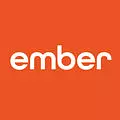
Ember.com has made quite a name for itself since its inception, particularly known for its innovative approach to everyday products: the temperature-controlled smart mugs and travel mugs. What sets Ember apart is its proprietary technology that allows users to set and maintain their preferred drinking temperature for hot beverages, enhancing the drinking experience dramatically. This unique feature has not only captured the attention of tech enthusiasts but also coffee and tea lovers who cherish their drinks at perfect temperatures.
Founded in 2012 by Clay Alexander, Ember Technologies has grown from a promising startup to a leader in the niche of temperature control kitchenware. The brand's journey from concept to market leader has been fueled by a focus on design, technology, and a keen understanding of consumer needs in a rapidly evolving tech landscape.
As Ember continues to expand its product line and market reach, it faces competition from various quarters – some direct competitors in the drinkware space and others from broader lifestyle and retail sectors. Let's delve into these competitors and see how they stack up against Ember.
Yeti is well-known for its rugged outdoor gear, especially its coolers and drinkware designed to withstand the rigors of outdoor activities. Though primarily targeting outdoor enthusiasts, Yeti's drinkware competes with Ember by offering highly durable products that maintain beverage temperatures for extended periods. While Yeti doesn’t offer smart temperature control, its reputation for insulation is a significant draw.
4.0 / 5
Stanley has been a stalwart in the thermal insulation products market since 1913, known for its legendary green steel bottles. Their products serve a similar purpose to Ember’s, aiming to keep drinks at desired temperatures for many hours. While they do not feature electronic temperature control, Stanley's proven track record and the emotional appeal of a heritage brand make it a formidable competitor.
3.8 / 5
Temu, a newer and broader online marketplace, offers a vast range of products, including kitchen and dining ware. While not a direct competitor in terms of brand focus, Temu competes on the basis of price and variety, offering affordable alternatives to Ember’s specialized products. This broad appeal can attract budget-conscious consumers looking for functional, non-tech-driven drinkware.
2.3 / 5
Wayfair, as a massive online retailer for home goods, carries a wide array of kitchen and dining products, including drinkware that competes with Ember. Although Wayfair does not produce these items, its ability to offer a diverse selection from various brands provides competition through convenience and variety.
Corkcicle enters the scene with an aesthetically pleasing design focus similar to Ember. They offer a line of stylish and functional drinkware intended to keep beverages cold or hot for hours. Like Ember, Corkcicle emphasizes design and innovation, but without the smart technology component. Their visually appealing products are geared towards a lifestyle-oriented consumer base.
Fellow Products markets itself with a strong emphasis on the craft of coffee making, offering products like kettles and coffee grinders that appeal to coffee aficionados. Their focus on the quality and precision of coffee brewing makes them a competitor to Ember, particularly for consumers invested in the entire coffee experience from bean to cup.
4.6 / 5
Costco is a wholesale giant offering a vast range of products, including competitively priced kitchen and dining ware. Its business model of low prices on bulk purchases presents a different kind of competition, appealing to price-sensitive consumers who may forgo high-tech features for good quality, affordable alternatives.
Hydro Flask specializes in high-quality insulated bottles and has a strong foothold in the market for active lifestyles. Their products maintain beverage temperatures for an extended period and are a favorite among outdoor and sports enthusiasts. Though they lack Ember’s tech features, their focus on insulation and lifestyle branding puts them in direct competition.
Klean Kanteen focuses on eco-friendly, stainless steel drinkware and competes with Ember through its emphasis on sustainability and health. By offering a wide array of insulated bottles and cups, they cater to environmentally conscious consumers looking for practical, durable solutions.
4.0 / 5
As a major player in home furnishings and decor, Crate & Barrel offers a wide variety of kitchenware, including high-quality drinkware. Their market presence and broad product range make them a competitor by providing consumers with more traditional, non-technological alternatives to Ember’s niche offerings.
Though it might seem an unlikely competitor, the Disney Store offers branded drinkware that appeals strongly to children and Disney enthusiasts. This niche market of character-driven merchandise competes on a different level, attracting a segment of the market that prioritizes design and branding over technological features.